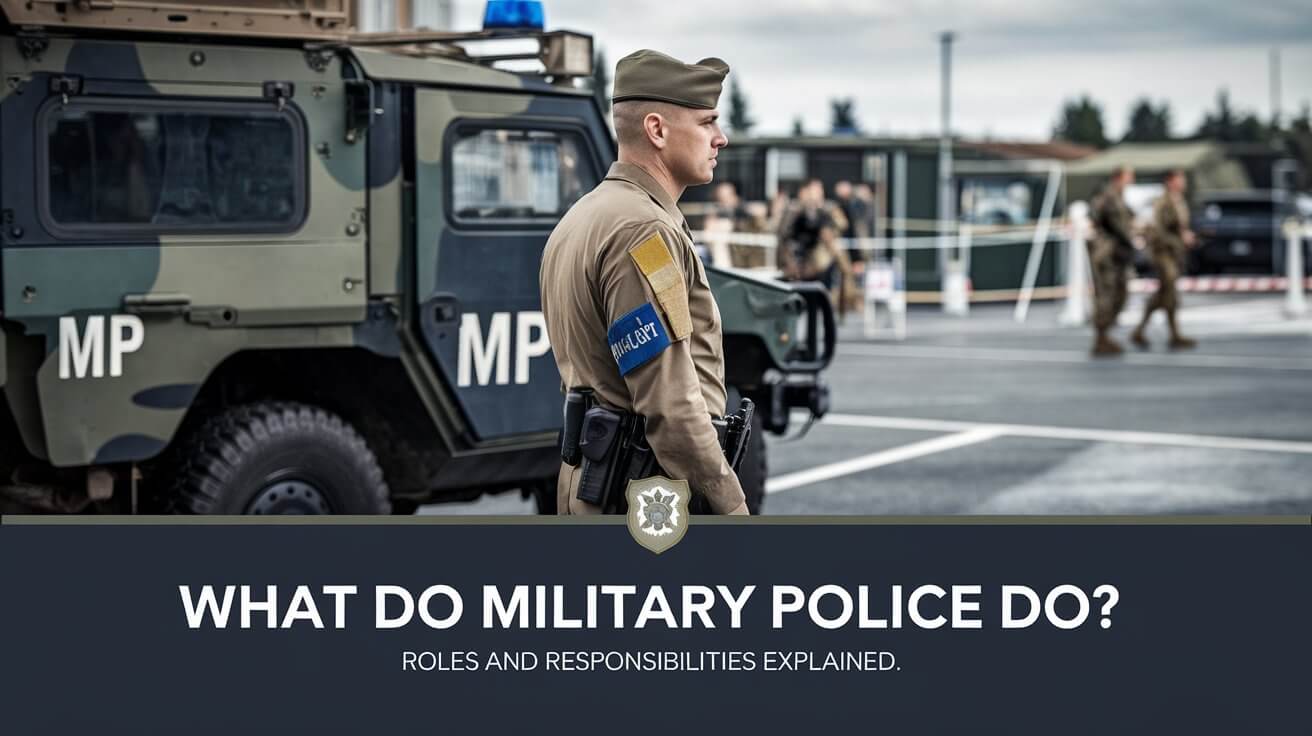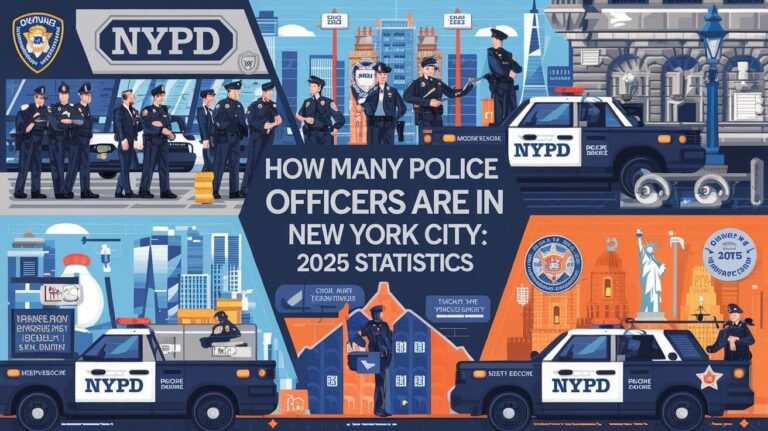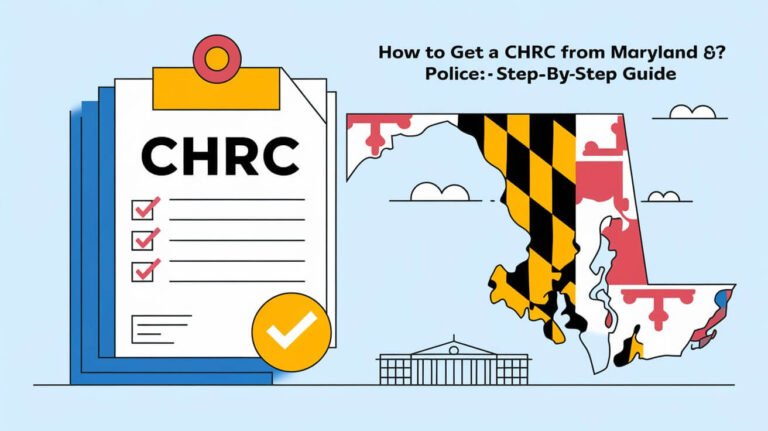What Do Military Police Do? Roles and Responsibilities Explained

Military police play a crucial role in maintaining order and security within the armed forces. These specialized law enforcement professionals handle a wide range of duties, from conducting criminal investigations to providing combat support in war zones. Their responsibilities extend far beyond what many civilians might expect, making them an essential component of military operations worldwide.
Introduction to Military Police
Definition and Purpose of Military Police
Military police, often referred to as MPs, are law enforcement professionals who serve within the armed forces. Their primary purpose is to uphold law and order, ensure security, and support military operations across various environments.
MPs differ from civilian police in several key ways. While they share many similar duties, military police operate under military jurisdiction and are trained to handle unique challenges specific to military settings. They must be prepared to function in both peacetime and combat situations, often switching between these roles rapidly.
Brief History of Military Police
The concept of military police dates back centuries, with early forms appearing in ancient Roman legions. However, the modern military police as we know it today began to take shape in the late 19th and early 20th centuries.
During World War I, the need for dedicated law enforcement within military ranks became apparent. This led to the formal establishment of military police units in many countries. Since then, the role of MPs has evolved significantly, adapting to changing warfare tactics, technological advancements, and global security challenges.
Core Functions of Military Police
Law Enforcement on Military Installations
One of the primary duties of military police is to enforce laws and regulations on military bases and installations. This includes:
- Patrolling base perimeters
- Responding to emergencies
- Investigating minor offenses
- Issuing citations for rule violations
- Managing traffic on base
MPs work to maintain a safe environment for service members, their families, and civilian employees living or working on military installations.
Criminal Investigations in the Military
Military police are often the first responders to crime scenes on military property. They conduct investigations into various offenses, including:
- Theft of military property
- Assault and battery
- Drug-related crimes
- Fraud and financial crimes
These investigations require specialized knowledge of military law and procedures, setting MP detectives apart from their civilian counterparts.
Security Operations
Ensuring the security of military assets, personnel, and information is a critical function of military police. This involves:
- Controlling access to sensitive areas
- Protecting high-ranking officials
- Safeguarding classified information
- Conducting security assessments
- Implementing anti-terrorism measures
MPs must stay vigilant and adapt to evolving security threats to protect military installations effectively.
Specialized Roles of Military Police
Detainee Operations and Prisoner of War Management
In times of conflict, military police take on the challenging task of managing detainees and prisoners of war (POWs). This role includes:
- Establishing and operating detention facilities
- Ensuring humane treatment of detainees
- Conducting interrogations in compliance with international laws
- Maintaining order within detention centers
- Facilitating prisoner exchanges
MPs must balance security concerns with adherence to international humanitarian laws in these sensitive operations.
Combat Support in War Zones
During wartime or in combat zones, military police provide crucial support to frontline troops. Their duties may include:
- Securing supply routes
- Conducting area reconnaissance
- Managing checkpoints
- Assisting in civil affairs operations
- Providing rear area security
This versatility makes MPs valuable assets in modern, dynamic battlefields.
Counterterrorism and Force Protection
With the rise of global terrorism, military police have taken on increased responsibilities in counterterrorism efforts. These include:
- Gathering intelligence on potential threats
- Conducting vulnerability assessments
- Implementing protective measures
- Training other units in force protection techniques
- Responding to terrorist incidents
MPs work closely with other military and civilian agencies to prevent and respond to terrorist threats effectively.
Military Police in Different Branches
Army Military Police
The Army’s Military Police Corps is the largest and most well-known MP force. Army MPs perform a wide range of duties, including:
- Law enforcement on Army installations
- Criminal investigations
- Battlefield circulation control
- Area security operations
- Internment and resettlement operations
Army MPs are often deployed alongside combat units to provide essential support services.
Air Force Security Forces
The Air Force equivalent of military police is known as Security Forces. Their responsibilities include:
- Protecting aircraft and air bases
- Conducting air base defense operations
- Managing military working dog programs
- Providing security for nuclear weapons facilities
- Performing law enforcement duties on Air Force installations
Air Force Security Forces play a crucial role in protecting some of the military’s most valuable and sensitive assets.
Naval Security Forces and Shore Patrol
In the Navy, security and law enforcement duties are handled by several entities:
- Master-at-Arms: The Navy’s dedicated law enforcement specialists
- Shore Patrol: Temporary duty assigned to sailors for maintaining order in ports
- Naval Security Forces: Responsible for protecting naval bases and assets
These units work together to ensure the safety and security of naval personnel and property both at sea and on shore.
Marine Corps Military Police
Marine Corps MPs share many similarities with their Army counterparts but are trained to operate in the unique environments faced by Marine expeditionary forces. Their duties include:
- Providing security for Marine Corps installations
- Conducting battlefield circulation control
- Supporting amphibious operations
- Performing civil affairs duties in occupied territories
- Assisting in humanitarian operations
Marine MPs must be prepared to transition quickly from peacetime policing to combat support roles.
Training and Qualifications for Military Police
Basic Training Requirements
All military police candidates must first complete basic military training for their respective branch. This provides a foundation in military discipline, physical fitness, and basic combat skills.
Following basic training, aspiring MPs undergo specialized law enforcement training. This typically includes:
- Criminal law and procedures
- Traffic management
- Use of force and firearms training
- First aid and emergency response
- Military customs and courtesies
The duration and specific content of this training vary by branch and country.
Specialized Military Police Training
After completing initial MP training, many service members pursue additional specializations. These may include:
- Advanced investigative techniques
- Hostage negotiation
- Special weapons and tactics (SWAT)
- K-9 handling
- Protective services
These specialized skills allow MPs to take on more complex and demanding roles within their units.
Ongoing Education and Skill Development
Military police must continuously update their skills to keep pace with changing laws, technologies, and threat environments. This ongoing education may involve:
- Annual recertification in firearms and use of force
- Courses in new investigative techniques
- Training in emerging technologies
- Leadership and management courses for career advancement
- Cross-training with civilian law enforcement agencies
This commitment to ongoing learning ensures that MPs remain effective and adaptable throughout their careers.
Equipment and Tools Used by Military Police
Weapons and Protective Gear
Military police are equipped with a range of weapons and protective equipment, including:
- Sidearms (typically pistols)
- Shotguns or rifles for certain operations
- Less-lethal weapons like tasers and pepper spray
- Body armor and tactical vests
- Helmets and eye protection
The specific gear varies depending on the mission and operating environment.
Vehicles and Transportation
MPs rely on various vehicles to perform their duties effectively:
- Patrol cars for routine law enforcement
- Armored vehicles for high-risk operations
- All-terrain vehicles for off-road patrols
- Motorcycles for traffic control and escorts
- Boats for waterway patrols
These vehicles are often specially modified to meet the unique needs of military law enforcement.
Technology and Communication Systems
Modern military police units utilize advanced technology to enhance their capabilities:
- Computer-aided dispatch systems
- Mobile data terminals in vehicles
- Body-worn cameras
- Biometric identification systems
- Secure radio communications networks
These tools help MPs work more efficiently and effectively in diverse operational environments.
Military Police in Peacetime Operations
Base Security and Access Control
During peacetime, one of the primary responsibilities of military police is maintaining security on military installations. This involves:
- Manning entry control points
- Conducting identity checks
- Patrolling the base perimeter
- Monitoring surveillance systems
- Responding to security breaches
MPs must balance the need for security with the practical considerations of daily base operations.
Traffic Management on Military Installations
Military bases often have complex traffic patterns and unique regulations. MPs are responsible for:
- Enforcing speed limits and parking regulations
- Directing traffic during special events or emergencies
- Investigating traffic accidents
- Conducting vehicle safety inspections
- Managing base vehicle registration programs
Effective traffic management helps ensure the safety and efficiency of base operations.
Community Policing in Military Communities
Many military installations are home to service members and their families. MPs often adopt community policing strategies to:
- Build positive relationships with base residents
- Provide crime prevention education
- Organize community outreach programs
- Address quality of life issues
- Support youth programs and activities
This approach helps create a safer, more cohesive military community.
Military Police in Combat and Deployment
Convoy Security and Route Reconnaissance
In combat zones, MPs play a crucial role in ensuring the safe movement of troops and supplies. Their duties include:
- Escorting convoys through high-risk areas
- Conducting route reconnaissance to identify potential threats
- Clearing roadways of obstacles and improvised explosive devices (IEDs)
- Providing mobile security for high-value targets
- Establishing temporary checkpoints along supply routes
These operations require a combination of law enforcement skills and combat tactics.
Area Security and Crowd Control
During military operations, MPs are often tasked with maintaining order in occupied territories. This may involve:
- Patrolling urban areas to deter criminal activity
- Managing large crowds during civil unrest
- Protecting key infrastructure and government buildings
- Coordinating with local law enforcement agencies
- Conducting cordon and search operations
MPs must balance the need for security with respect for local customs and civilian rights.
Support for Civil Affairs Operations
Military police often work closely with civil affairs units to help restore law and order in conflict zones. Their responsibilities may include:
- Training local police forces
- Assisting in the reconstruction of justice systems
- Providing security for humanitarian aid operations
- Mediating disputes between military forces and local populations
- Supporting disarmament and demobilization efforts
These activities are crucial for establishing stability and transitioning to civilian control.
Collaboration with Civilian Law Enforcement
Joint Operations and Task Forces
Military police frequently collaborate with civilian law enforcement agencies on cases that cross jurisdictional boundaries. This cooperation may involve:
- Participating in joint drug enforcement task forces
- Sharing intelligence on potential terrorist threats
- Providing support during major events or natural disasters
- Conducting joint training exercises
- Assisting in missing person investigations involving service members
These partnerships enhance the capabilities of both military and civilian law enforcement.
Information Sharing and Mutual Assistance
Effective collaboration requires open communication between military and civilian agencies. MPs facilitate this by:
- Maintaining liaison officers with local police departments
- Participating in regional law enforcement information sharing networks
- Providing specialized resources (like working dogs or bomb disposal units) to civilian agencies
- Offering training opportunities to civilian officers
- Coordinating responses to incidents that affect both military and civilian communities
This mutual support helps create a more comprehensive law enforcement network.
Jurisdictional Considerations
The relationship between military police and civilian law enforcement is governed by complex legal frameworks. Key considerations include:
- Understanding the limits of military authority off-base
- Navigating overlapping jurisdictions in areas near military installations
- Adhering to posse comitatus restrictions on military involvement in civilian law enforcement
- Coordinating investigations that involve both military and civilian suspects
- Managing cases that transition between military and civilian court systems
MPs must have a thorough understanding of these legal issues to operate effectively alongside their civilian counterparts.
Challenges Faced by Military Police
Balancing Law Enforcement and Military Duties
Military police often find themselves caught between two worlds – law enforcement and military operations. This dual role can present challenges such as:
- Maintaining law enforcement objectivity while part of the military chain of command
- Switching between peacetime policing and combat support roles
- Enforcing regulations on fellow service members
- Balancing the need for security with individual rights and freedoms
- Managing the stress of potential deployment while performing daily law enforcement duties
Successful MPs must be adaptable and able to navigate these competing demands effectively.
Adapting to Changing Threat Environments
The nature of military operations and global security threats is constantly evolving. MPs must continually adapt to:
- Emerging technologies used by criminals and adversaries
- Changing tactics in asymmetric warfare
- New forms of cybercrime and information warfare
- Evolving international laws and rules of engagement
- Shifts in public perception and expectations of law enforcement
Staying ahead of these changes requires ongoing training and a willingness to embrace new approaches.
Ethical Considerations in Military Policing
Military police often face complex ethical dilemmas in the course of their duties. These may include:
- Balancing operational security with transparency and accountability
- Maintaining impartiality when investigating high-ranking officers
- Upholding human rights standards in detention operations
- Navigating cultural differences in overseas deployments
- Managing the psychological impact of combat experiences on law enforcement judgment
MPs must have a strong ethical foundation and access to support systems to help them navigate these challenging situations.
Career Progression and Opportunities in Military Police
Ranks and Promotions
Military police can advance through the enlisted ranks or pursue officer careers. Typical progression might include:
- Entry-level positions like patrolman or security specialist
- Non-commissioned officer roles such as squad leader or shift supervisor
- Senior NCO positions like operations sergeant or provost sergeant
- Warrant officer specializations in areas like criminal investigation or corrections
- Commissioned officer roles ranging from platoon leader to provost marshal
Advancement often requires a combination of time in service, job performance, and additional training or education.
Specialized Units and Advanced Positions
As MPs gain experience, they may have opportunities to join specialized units such as:
- Criminal Investigation Division (CID)
- Protective services details
- Special Reaction Teams (military SWAT)
- Military working dog units
- Corrections specialist teams
These positions often come with additional training, responsibilities, and potential for career advancement.
Transition to Civilian Law Enforcement Careers
Many military police find that their skills and experience translate well to civilian law enforcement careers. Opportunities may include:
- Local or state police departments
- Federal law enforcement agencies like the FBI or Secret Service
- Private security firms
- Corporate security management
- Law enforcement training and education roles
The leadership, discipline, and specialized skills developed in military policing are often highly valued in the civilian sector.
The Future of Military Police
Evolving Roles in Modern Warfare
As warfare continues to change, the roles of military police are likely to evolve. Future MPs may need to:
- Develop expertise in cyber-security and digital forensics
- Expand capabilities in counter-drone operations
- Enhance skills in managing autonomous security systems
- Adapt to new challenges in urban warfare and megacity operations
- Prepare for increased involvement in space-based security operations
Flexibility and a willingness to embrace new technologies will be crucial for future MP units.
Technological Advancements in Military Policing
Emerging technologies are reshaping how military police operate. Future developments may include:
- Increased use of artificial intelligence in threat detection and analysis
- Advanced biometric systems for access control and suspect identification
- Widespread adoption of augmented reality for training and operations
- Integration of robotics and autonomous systems in security patrols
- Enhanced non-lethal weapons for crowd control and detainee management
MPs will need to stay at the forefront of these technological advancements to remain effective.
International Cooperation and Standardization
As military operations become increasingly multinational, there’s a growing need for standardization among military police forces. This may involve:
- Developing common training standards for NATO and allied MP units
- Increasing joint exercises and personnel exchanges
- Harmonizing equipment and communications systems
- Establishing shared databases and information-sharing protocols
- Creating unified procedures for multinational law enforcement operations
These efforts will enhance the ability of military police to operate effectively in coalition environments.
Conclusion: The Vital Role of Military Police in Armed Forces
Military police serve as the guardians of order and justice within the armed forces. Their diverse responsibilities – from maintaining law and order on bases to providing critical support in combat zones – make them an indispensable part of modern military operations.
As the nature of warfare and global security continues to evolve, so too will the roles and capabilities of military police. By embracing new technologies, adapting to changing threat environments, and fostering international cooperation, MPs will continue to play a crucial role in protecting military communities and supporting mission success around the world.
The men and women who serve as military police demonstrate a unique combination of law enforcement expertise and military discipline. Their dedication to duty, often in challenging and dangerous circumstances, ensures the safety and effectiveness of armed forces worldwide. As we look to the future, the importance of these skilled professionals in maintaining military readiness and security cannot be overstated.






